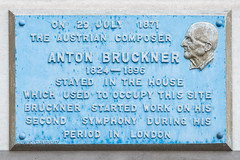Anton Bruckner
Commemorated on 1 plaque
On 29 July 1871 the Austrian composer Anton Bruckner 1824-1896 stayed in the house which used to occupy this site Bruckner started work on his second symphony during his period in London
39-45 Finsbury Square, EC2, London, United Kingdom where they was


